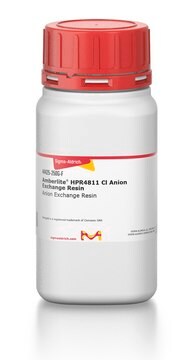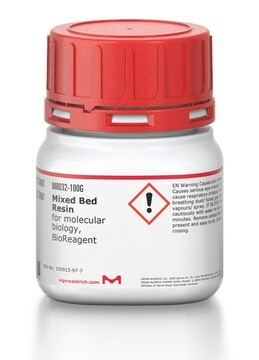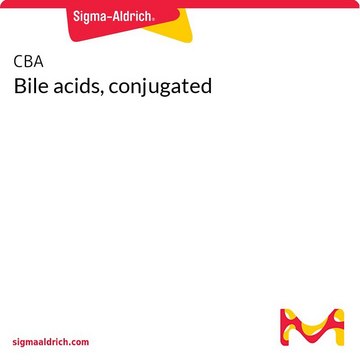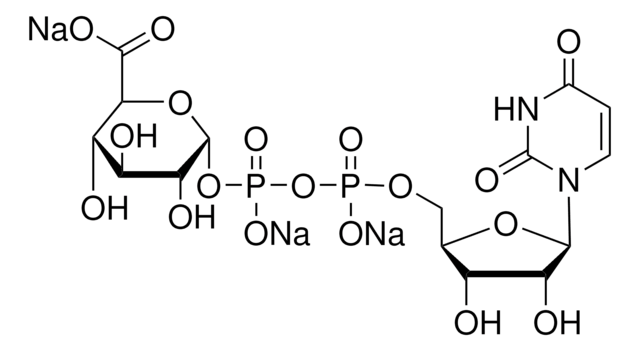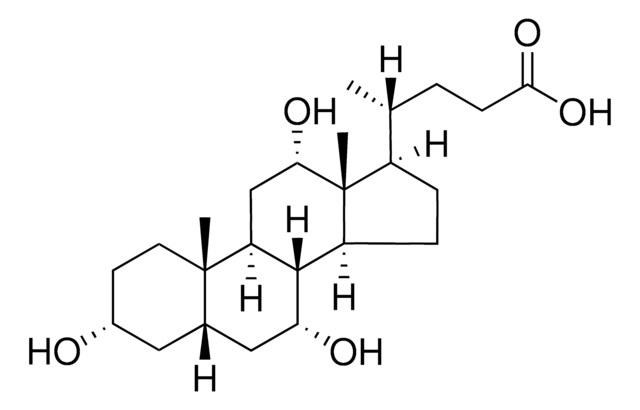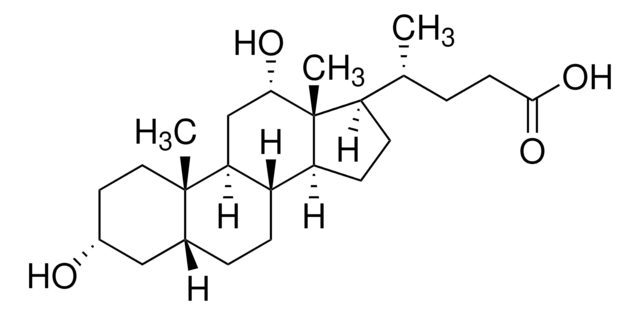C4650
Cholestyramine resin
Synonym(s):
Colestyramine, Dowex 1X2 Cl--Form
Sign Into View Organizational & Contract Pricing
All Photos(1)
About This Item
Recommended Products
form
powder
Quality Level
technique(s)
activity assay: suitable
matrix
polystyrene/divinylbenzene
pH
4—6
capacity
~1.0 meq/g(dry)
Application
Cholestyramine resin has been used:
- as a diet supplement to study the bile acid pool size and fecal bile acid output in mice
- to alter the bile acid (BA) levels and study its effect on liver fibrosis development in wild type (WT), fibroblast growth factor 15 (Fgf15)−/−, and Fgf15 transgenic (TG) mice
- in in vitro digestion process to study the capacity of the fractions for binding bile acid (BA)
Cholestyramine resin is used in protein chromatography, ion exchange chromatography and anion exchange media. Cholestyramine has been used to study the relief of postcholecystectomy diarrhea, the management of intractable cholestatic pruritus and obesity.
Biochem/physiol Actions
Cholestyramine is a cationic exchange resin polymer. This resin is a bile acid sequestrant that interchanges chloride anions for bile acids of the small intestine lumen, leading to excretion of bile acids in the feces and reduced levels of serum bile acid. Cholestyramine is used to treat primary hypercholesterolemia. The resin induces dose-dependent reduction of low-density lipid (LDL) cholesterol. It ameliorates the risk of coronary artery disease.
Other Notes
Quartenary ammonium functional groups attached to cross-linked polystyrene
Legal Information
Storage Class Code
11 - Combustible Solids
WGK
WGK 2
Flash Point(F)
Not applicable
Flash Point(C)
Not applicable
Personal Protective Equipment
dust mask type N95 (US), Eyeshields, Gloves
Certificates of Analysis (COA)
Search for Certificates of Analysis (COA) by entering the products Lot/Batch Number. Lot and Batch Numbers can be found on a product’s label following the words ‘Lot’ or ‘Batch’.
Already Own This Product?
Find documentation for the products that you have recently purchased in the Document Library.
Customers Also Viewed
Noémie Péan et al.
Hepatology (Baltimore, Md.), 58(4), 1451-1460 (2013-05-21)
Many regulatory pathways are involved in liver regeneration after partial hepatectomy (PH) to initiate growth, protect liver cells, and sustain functions of the remnant liver. Bile acids (BAs), whose levels rise in the blood early after PH, stimulate both hepatocyte
Yoshimine Fujii et al.
International journal of pharmaceutics, 421(2), 244-251 (2011-10-18)
A clinical trial of (2S)-2-[4-[[(3S)-1-acetimidoyl-3-pyrrolidinyl]oxy]phenyl]-3-(7-amidino-2-naphtyl) propanoic acid (DX-9065) revealed that its oral bioavailability was only 3% when it was administered as a conventional capsule formulation. The low bioavailability of DX-9065 was likely caused by both its poor membrane permeability and
Akiko Ozaki et al.
Sleep medicine, 13(2), 200-206 (2011-12-06)
To assess the quality of life of patients with narcolepsy with cataplexy (NA-CA), narcolepsy without cataplexy (NA w/o CA), and idiopathic hypersomnia without long sleep time (IHS w/o LST) who were taking psychostimulant medication, and to ascertain which factors (including
Shahram Ala et al.
World journal of surgery, 37(3), 657-662 (2012-12-12)
The aim of the present study was to evaluate the efficacy of cholestyramine ointment (15 %) in reducing postoperative pain at rest and during defecation after open hemorrhoidectomy. A total of 91 patients with third and fourth degree hemorrhoids undergoing
Ellin Simon et al.
Journal of anxiety disorders, 26(2), 287-296 (2012-01-17)
In this study, the cost-effectiveness of three indicated anxiety prevention strategies was examined from a societal perspective. Children (aged 8-12) were recruited via primary schools, selecting children scoring as high-anxious on an anxiety screening questionnaire. Participating children and their parents
Our team of scientists has experience in all areas of research including Life Science, Material Science, Chemical Synthesis, Chromatography, Analytical and many others.
Contact Technical Service
